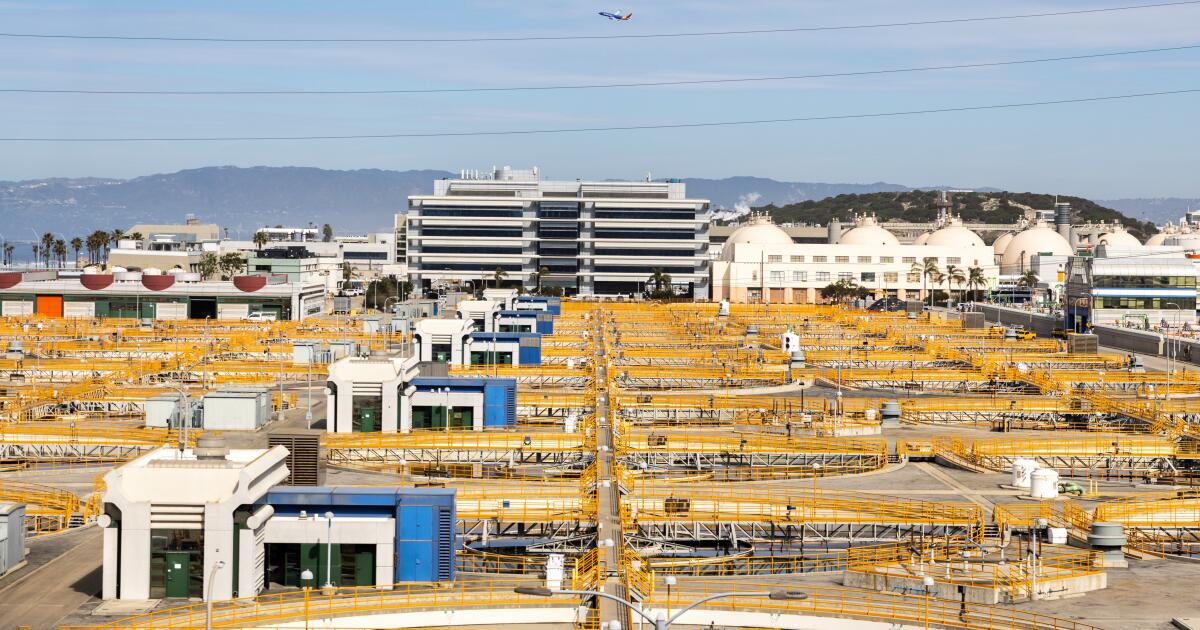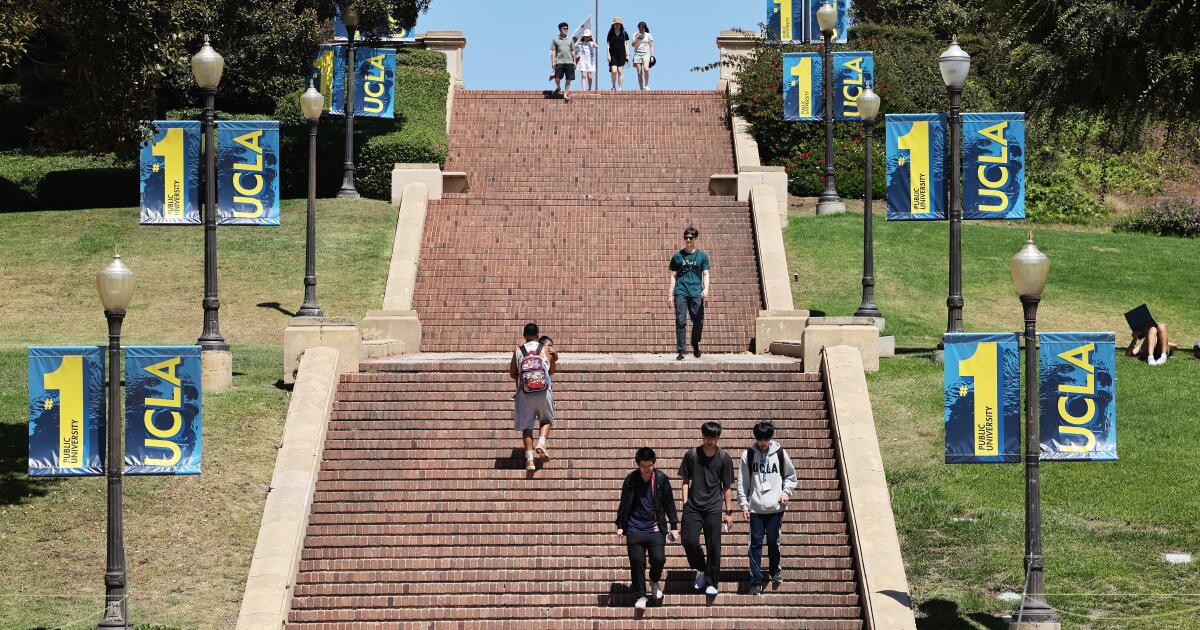Both blue and red areas affected by $8 billion in cuts for energy projects
The Trump administration this week escalated its efforts against renewable energy when it announced the cancellation of $7.56 billion in funding for projects in 16 states, including California.
The U.S. Department of Energy said the 223 canceled projects — all of which are in states that favored Kamala Harris in the 2024 presidential election — were terminated because they “did not adequately advance the nation’s energy needs, were not economically viable, and would not provide a positive return on investment of taxpayer dollars.”
But while the cuts took aim at blue states, they will affect Trump’s base as well: The terminated projects span districts represented by 108 Democratic members of Congress and 28 Republicans. In California, that includes large swaths of the Central Valley and Inland Empire, which largely leaned toward Trump in 2024.
Russell Vought, director of the White House’s Office of Management and Budget and a top Trump administration official, said in a post on X that the canceled projects were using “Green New Scam funding to fuel the Left’s climate agenda.”
The biggest cut was $1.2 billion for California’s ambitious project to develop clean hydrogen known as the Alliance for Renewable Clean Hydrogen Energy Systems, or ARCHES. It was awarded by the Biden administration as part of a competitive nationwide effort to develop hydrogen projects. The idea is that the hydrogen, which burns at a very high temperature, will be able to replace planet-warming fossil fuels in some industry and transportation uses.
The ARCHES project is a public-private partnership that would create at least 10 hydrogen production sites around the state, primarily in the Central Valley. It would also help transition two large gas-fired power plants — Scattergood in Los Angeles and the Lodi Energy Center in San Joaquin County — to 100% renewable hydrogen, and develop more than 60 hydrogen fueling stations in areas including Fresno, Riverside, Orange and San Joaquin counties.
In all, it would deliver an estimated 220,000 jobs, including 130,000 construction jobs and 90,000 permanent jobs, according to the state. California is pursuing hydrogen in addition to renewables such as offshore wind, solar power and geothermal energy to help diversify its supply, meet growing demand driven by artificial intelligence data centers, and reach its target of 100% carbon neutrality by 2045.
The Trump administration said terminating the clean energy projects will save taxpayers money.
One district with a project that’s been cut is the northern San Joaquin Valley, represented by Tom McClintock (R-Elk Grove). McClintock said he strongly supports the Energy Department’s decision.
“$7.5 billion comes out to about $60 taken from the average earnings of every family in America,” McClintock said. “Call me old fashioned, but I think that companies should make their money by pleasing their customers and not by using government to take money that families have earned.”
The Times also reached out to Reps. Vince Fong (R-Bakersfield), Doug LaMalfa (R-Richvale), Keven Kiley (R-Rocklin), Ken Calvert (R-Corona), Young Kim (R-Anaheim Hills) and Jay Obernolte (R-Big Bear Lake), whose districts are touched by the ARCHES hub and other terminated projects.
A representative for Fong said his office was dealing with issues related to the U.S. government shutdown and so was unable to comment. None of the others responded.
Jesse Lee, senior advisor with the nonprofit group Climate Power, said the cancellations may not save taxpayers money, but cost them. The administration this year has canceled a $7 billion program to help low-income households install solar panels on their homes and halted the development of off-shore wind projects, among other efforts.
“Having these projects come to fruition is really the only chance we have at insulating people from skyrocketing utility bills year after year,” Lee said — particularly in the face of energy-thirsty AI. “The only way to have a prayer of meeting that demand is through these kinds of clean energy projects.”
Lee believes the actions could come back to haunt the party in the midterm elections. Since Trump took office in January, at least 142 clean energy projects have been canceled affecting what his group estimates is at least 80,500 jobs — not including the latest round of cuts announced this week. About 47% of those jobs were in congressional districts represented by Republicans, according to Clean Power’s energy project tracker.
Democratic officials in California said the Energy Department’s latest cuts amount to political retaliation. They were announced on the first day of the shutdown, which the administration blames on Democrats.
“The cancellation of ARCHES is vindictive, shortsighted, and proof that this Administration is not serious about American energy dominance,” California Sens. Adam Schiff and Alex Padilla wrote in a joint letter to Energy Secretary Chris Wright dated Thursday, in which they urged him to restore its funding.
“The cancellation of this award threatens the future promise of hydrogen energy, leaving us behind the rest of the world,” the senators said. “The ARCHES hub is a key strategic investment into American energy dominance, energy technology prominence, manufacturing job growth, and lowering energy costs for American families.”
The cuts come as the Trump administrations eases the path for production of fossil fuels such as oil, gas and coal, including this week’s announcement that it will open 13 million acres of federal lands for coal mining and provide $625 million to recommission or modernize coal-fired power plants. Coal has become increasingly uncompetitive with either natural gas or solar power.
Large-scale renewable energy and carbon capture projects in red states such as Wyoming, Ohio, Texas, Louisiana and North Dakota that received funding from the Energy Department were not subject to the cuts.
Other canceled awards in California include $630 million to the California Energy Commission for grid resilience upgrades; $500 million to the National Cement Company of California for a carbon-neutral cement production facility; $87 million to Redwood Coast Energy Authority for grid updates benefiting tribal communities; $50 million to Southern California Edison for a battery energy storage project; and $18 million to the Imperial Irrigation District to modernize its electrical grid, bolster resiliency against power outages and catalyze renewable energy usage.
“We are disappointed as we did a great deal of work to win the $18.3 million matching grant from the DOE to help modernize our electrical grid and enhance reliability for our customers,” said Robert Schettler, a spokesman for the Imperial Irrigation District located in southeastern California. “Despite this setback, we will reevaluate the scope as the project is a necessity.”
Officials with ARCHES called the administration’s decision a “short-sighted move that abandons America’s opportunity to lead the global clean energy transition.” They said they hope to keep the project moving forward even without the federal grant; ARCHES has also secured more than $10 billion in private funding agreements.
“Despite the loss of federal funding, we will press forward with our state, private, and international partners to build the infrastructure, train the workforce, and establish the supply chains that will power a modern, resilient energy economy,” ARCHES board chair Theresa Maldonado said in a statement.

